Graduate Students
Dingning Chen, PhD Candidate
Dingning is from Hefei, China. In her junior year, she transferred from Anhui Agricultural University to Colorado State University and received both her BS in biological science and her BA in German language, literature and culture. In her undergraduate years, she focused on her research project about gender study and women’s writing in Weimar Republic, and also LGBT films in that time period with a special focus on the film Mädchen in Uniform. In addition, she also tried to combine science with German Study, hoping to find the relationship between technology/science and the German films and literature in early 20th century.
For now, she is interested in exploring the topic of the Weimar Republic further, while she also hopes to focus more on Nazi history and literature. Currently, she is particularly interested in combining Asian Study with German study, including the narratives about China in German literature and those about Germany in Chinese, and the history about China taking in a certain proportion of Jewish refugees during Holocaust.
Dave Dermon, PhD Candidate
Dave graduated from Sewanee: The University of the South in 2016 with BA degrees in both German and history. As a German major, he focused on twentieth century literature as coping mechanisms for the economic, political, and social tumult of the first half of the century. His history studies concentrated on international networking and diplomacy at the turn of the eighteenth century. This work was made possible through undergraduate grants to study the letters and journal of Heinrich Wilhelm Ludolf in the Staatsbibliothek Berlin and August Hermann Francke Institute, Halle (Saale). Following this, he attended the University of St. Andrews and completed a Master of Letters in Modern History with a dissertation concerning the perceptions of modernity of Deutscher Werkbund’s 1927 exhibition ‘Die Wohnung’ and Weißenhof housing estate as well as work on the history of infrastructure and spatial theory.
Presently, Dave’s research interests are focused on application of spatial theory in the early twentieth century. Having worked as an interdisciplinary academic previously, he values cross-discipline approaches to explore the creation of boundaries, both real and imagined.
Cooper Dougherty, PhD Candidate
Cooper received her BA in German Studies from Tulane University in 2014. As an undergraduate, she assisted the Historic New Orleans Collection with translation of documents from the 1800’s belonging to the German Society of New Orleans. In addition, Cooper spent a semester abroad in Berlin, where she took courses at IES Abroad and Humboldt University. While in Berlin, she completed an internship at the Evangelische Schule Berlin Mitte as an English teacher’s assistant. Since graduation, Cooper spent most of her time working in museums in New Orleans, inspiring her research and career interests in cultural history and museum studies. She is excited to be part of the German Department at Georgetown and further cultivate these interests.
Cooper’s primary research interests include: German cultural history of and relating to the early-mid 20th century, depictions of German history and politics in contemporary culture, and film studies.
Emma Eisenbeis, PhD Candidate
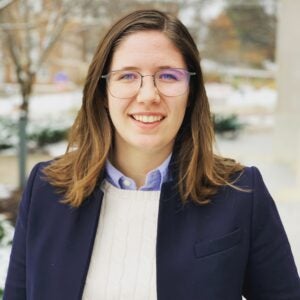
Emma is a graduate of Kalamazoo College, where she earned her BA in German Studies and Political Science in 2019. During her time as an undergraduate, Emma was involved in varsity athletics, student government, the Offices of Admission and Advancement, and acted as a student advisor in the German Department. In addition to these activities, she spent a semester abroad in Erlangen, Germany, where she attended the Friedrich Alexander University while simultaneously completing an English teaching assistantship at Ohm Gymnasium. Throughout the course of her studies, Emma received two excellence awards in German Studies, the Kalamazoo College Senior Leadership Award, and was inducted in the national German Studies honor society, Delta Phi Alpha, as well as Phi Beta Kappa. After graduating, Emma was awarded a Fulbright grant to work for two years in Schleswig-Holstein, Germany, as an English Teaching Assistant at the Coppernicus Gymnasium.
In the past, Emma has researched and written about such topics as the importance of English language course offerings in the German school system, political activism in German youth, and the impact of comprehensive civic education on political and social engagement in American society. She hopes to find intersections in her research as she explores more topics related to education and political engagement in German society and history.
Mel Hardy, PhD Candidate
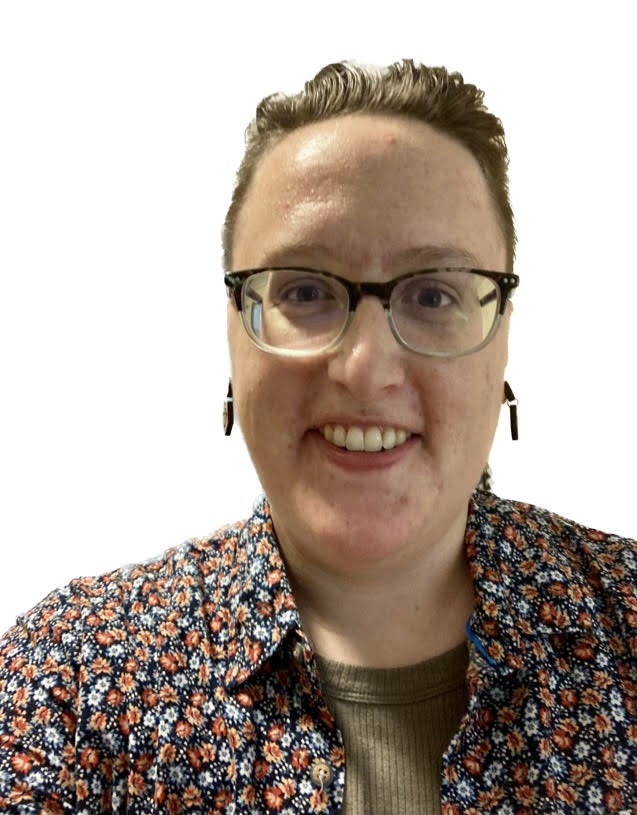
Mel started their graduate studies at Georgetown in Fall 2017, obtaining their MA in passing in 2020. They are working towards both a Ph.D. in German Studies and a Ph.D. Certificate in Disability Studies. They received their BA in German and Russian from the University of Iowa in December 2014. As an undergraduate, they participated in the Academic Year in Freiburg program, taking courses in Baden-Württemberg at Albert-Ludwigs-Universität and the Pädagogische Hochschule Freiburg. They later worked as a freelance translator and tutor and spent two years as an English Teaching Assistant at the Gymnasium-level with the Austrian-American Educational Commission (now Fulbright Austria), first in Feldkirch, Vorarlberg, and then in Vienna. They are very fond of teaching and expanding their knowledge of language pedagogy and genre theory.
Mel’s current research interests include 20th century German and Austrian Literature, focusing on representations of identity, primarily disability, gender, and cultural hybridity. Their dissertation is titled Literary Case Studies in the Social Power Dynamics of Non-normative Embodiment: Synthesizing Disability Sentiments across German & Austrian Fiction & Poetry 1900-1933. This dissertation explores the social power dynamics that manifold disability depictions across genre, content, disability ‘type’, and authorial backgrounds reveal. The project aims to better locate/understand the cultural attitudes towards disabled people before the Nazi genocide of an estimated 300,000 adults with disabilities. The dissertation is structured thematically into five chapters with their own theoretical framework: 1) Methodological Contextualization 2) Eugenics Discourse as Reference Point for Early 20th Century Disability Notions 3) Disabled Authors & Cripistemological Perspectives 4) War Disablement, and 5) Feminist Disability Studies. All chapters address three primary research questions: A) What symbolic meanings are given to disabled bodies? B) How is the social strain on disabled characters depicted across literary works? And C) Do literary depictions tangibly hierarchize disability?
Steven Kingkiner, Accelerated BA/MA Candidate

Steven Kingkiner received his BA in German from Georgetown University in 2022 and minored in Business Administration and Justice & Peace Studies. At the end of his first year on the Hilltop, he participated in the German Department’s summer abroad program in Trier, living with a host family and completing the Intensive Intermediate German course. Shortly after, Steven began working in the department as a clerical assistant. In addition to this role, he worked with the department as a TA for intermediate German, a research assistant for professors updating the Business in Germany course, and hosted the German Help Desk. Outside of the department, Steven explored his interests in sports, which saw him work with Georgetown’s Field Hockey and Men’s Soccer teams in operations positions, on top of writing and photographing for the Georgetown Voice’s sports section. Rather than head straight into the last year of the accelerated BA/MA program after graduation, he took a year off to teach English in Ahlen, Germany, after being selected for a Fulbright ETA grant. Following his year teaching in Germany, Steven is excited to return to the Hilltop and continue his studies.
Steven’s primary interests include: German identity and how it has changed over time; non-violent resistance, focusing on the prison rights movement and refugee crisis; and the role intersectionality plays in sports, focusing on people of color in Germany.
Shoshannah Lane, PhD Candidate
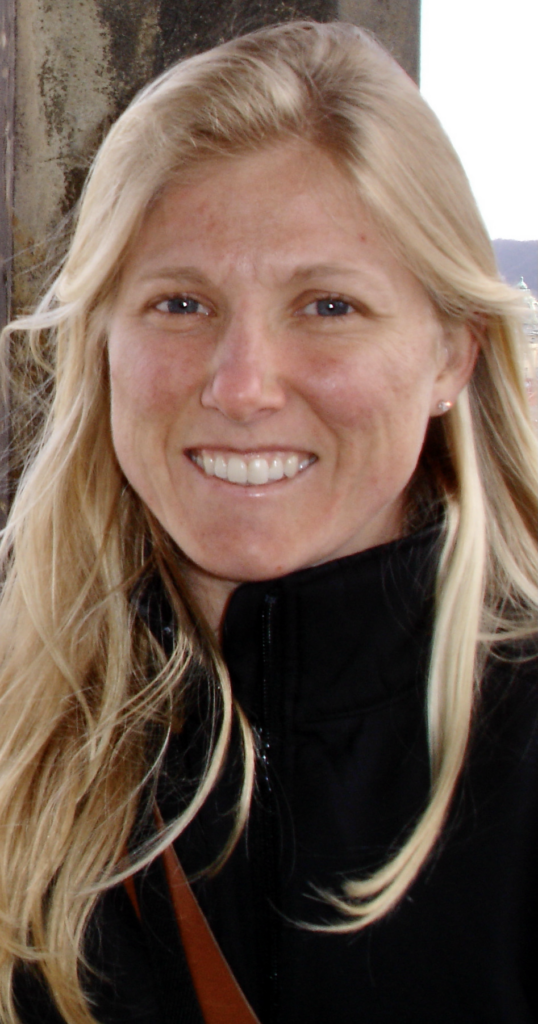
Shoshannah first studied German as a freshman in high school in South Jersey. Immediately enamored with the culture and language, she pursued every possible avenue to further her German proficiency, including a four-week exchange program in southern Bavaria. She credits much of her love for the language, culture and teaching to her high school teacher, who created an immersive environment within the classroom. Following high school, Shoshannah studied one year at the Institute of German Studies, an extension of Concordia College, Moorhead, in Bemidji, Minnesota. She went on to earn a BS while majoring in German and Russian at the United States Military Academy in West Point, New York. Commissioned as Second Lieutenant in the Aviation Branch, she temporarily postponed her German studies to attend flight school and serve in the Army as an officer. In 2008, the Army provided Shoshannah the opportunity to earn her MA in German to return to West Point and teach in the Department of Foreign Languages. She earned her MA from Middlebury College in 2009 after studying at Middlebury for the summer semester and at the Johannes Gutenberg University in Mainz, Germany for two semesters. She taught Basic and Intermediate German at West Point until 2011, when she continued performing aviation duties. Still in the Army, she most recently completed two years as a battalion commander at Joint Base Lewis-McChord in Washington. Shoshannah is now pursuing her PhD to return to West Point as an Academy Professor of German. She is grateful for her Army career and for the opportunities she has been afforded to grow professionally, academically, and personally.
Shoshannah’s research interests include second language acquisition, applied linguistics, and curriculum development. Based on her own language learning experience, she is drawn to the cultural and literacy aspects of curriculum development and execution. Shoshannah also looks forward to studying German literature and culture at Georgetown.
Katie Lightfoot, PhD Candidate
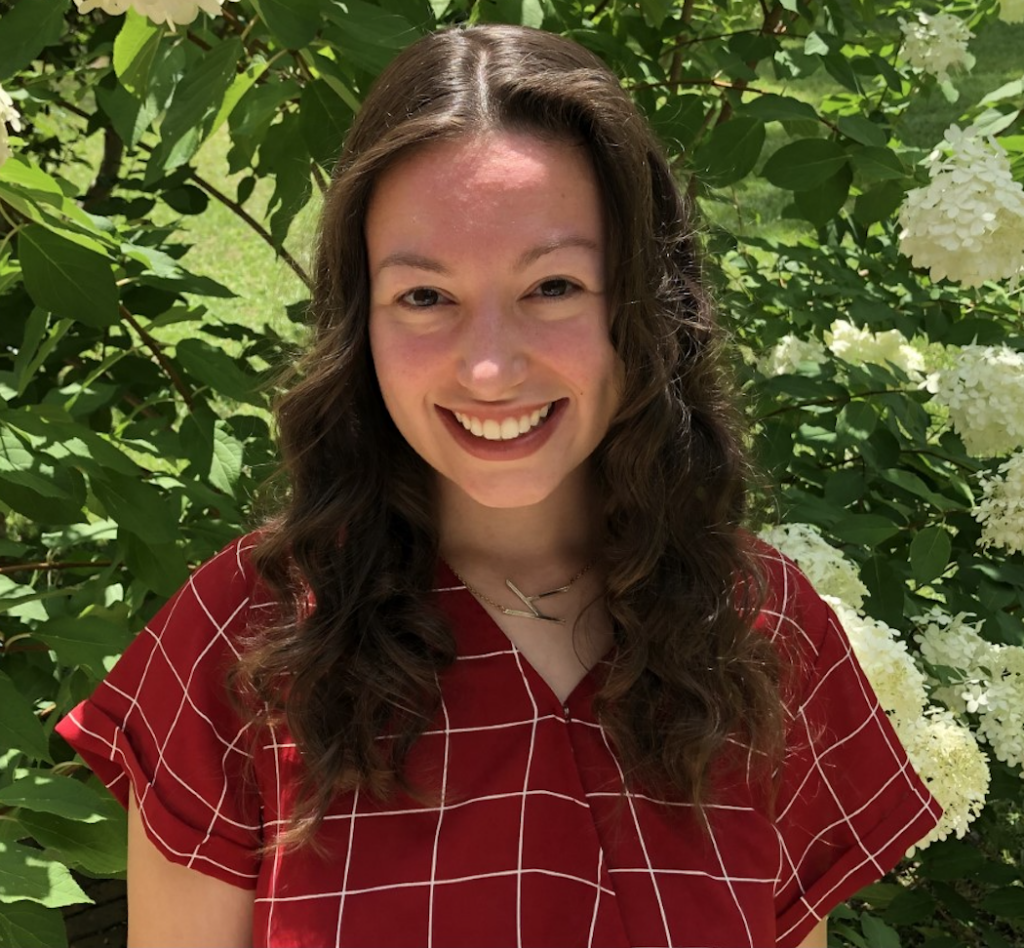
Katherine (Katie) Lightfoot grew up in Tuscaloosa, AL, and graduated with a BA in International Studies and German from The University of Alabama (UA). As an undergraduate student, she spent one year in Hamburg, Germany, on an academic exchange through the Federation of German-American Clubs. She then decided to begin her MA in German Literature and completed a Master’s in German at UA. During the 2021-2022 academic year, Katie lived in Cuxhaven, Germany, and taught English and German on a Fulbright grant. In June of 2023, Katie traveled to Berlin to participate in the “German Literary Institutions: The Berlin Seminar”. (http://gliberlinseminar.weebly.com/ )
Her research interests include migration studies and transnational literature published in the German-speaking world, as well as second-language acquisition and reflective teaching and learning.
Lorna McCarron, PhD Candidate
Lorna received her BA in German Studies from the University of St Andrews, Scotland in 2020. Her undergraduate thesis focused on literary and cinematic representations of the mass rapes of German women by occupying forces following the Second World War. She looked at how the depiction of the subjective female experience has been constrained by evolving memory politics.
Lorna’s primary research interest is in the representation of women in German literature and cinema of the twentieth century, as well as studies of GDR history and culture. As an undergraduate, Lorna received a Laidlaw scholarship that funded her to work on an original project comparing the reception of the contraceptive pill in the writings of women from East and West Germany. This project introduced Lorna to the field of Medical Humanities; in her graduate work, she is continuing to incorporate such an interdisciplinary approach.
Katherine Miller-Purrenhage, PhD Candidate
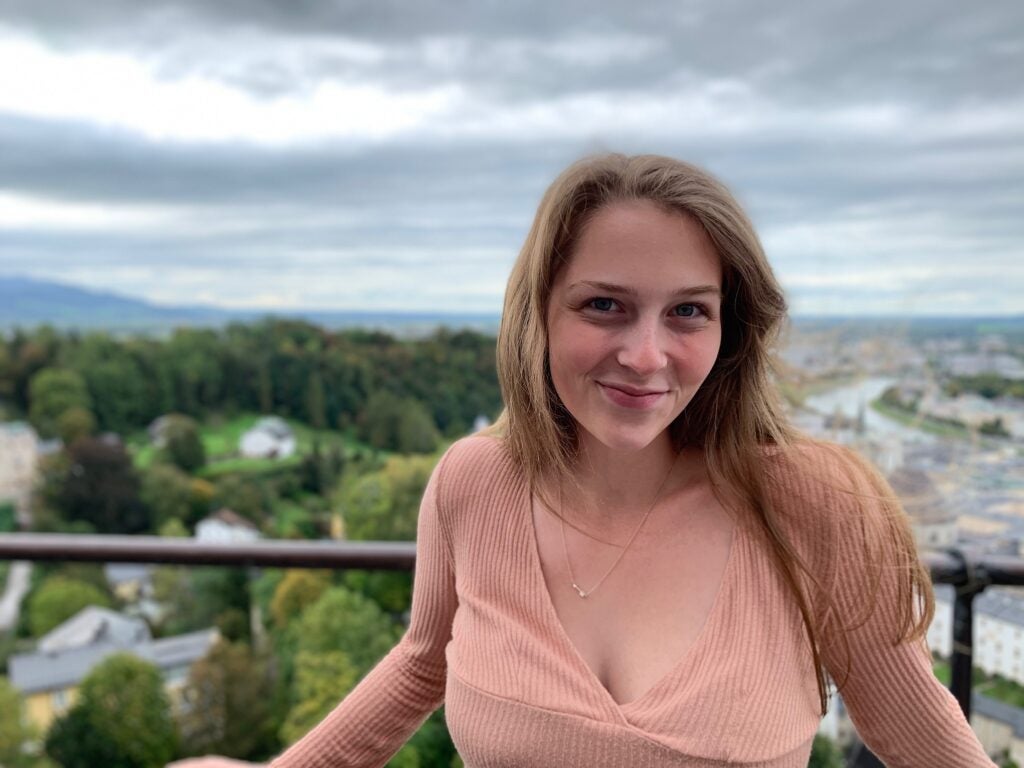
Katherine Miller-Purrenhage graduated from Kalamazoo College in 2021, where she earned her BA in German Studies and Music, with a minor in Philosophy. During her undergraduate years, Katherine played flute in the college band and orchestra, sang in the choir, tutored at a local elementary school, participated in philosophy club (of which she co-founded a sector for non-men identifying people), and acted as both the Departmental Student Advisor for the German Department and as a German Teaching Assistant. In the summers of 2019 and 2020, Katherine worked at the Latinx-run nonprofit El Concilio as the Assistant Program Coordinator. She also spent a semester abroad in Erlangen, Germany, where she attended the Friedrich-Alexander Universität as a full time student and interned at the Eichendorffschule Erlangen as both an English and DaZ (German as a second language) teaching assistant. During her undergraduate studies, Katherine received four excellence awards in Music, two excellence awards in German Studies, as well as German Departmental Honors. She was also inducted into the Alpha Delta Phi German Honor Society. After graduating, Katherine earned a Fulbright Teaching Assistantship in Germany, working for a year at two Gymnasien in Bamberg and Höchstadt while taking classes part-time at Otto-Friedrich Universtität Bamberg.
Katherine’s research interests (some of which she had the privilege to write about) include inclusive pedagogy, decolonization of German Studies, second and foreign language acquisition, and existentialist and ethical philosophy. She is hoping to intersect these topics in her research at Georgetown, focusing on the interdisciplinary approach to teaching a foreign language with an inclusive and decolonized approach. Her CV can be found here.
Ross Parks, MAGES/PhD Candidate
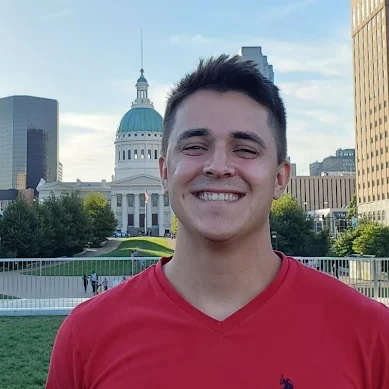
Ross graduated from the University of Missouri in 2018 with BA degrees in German and International Studies – Peace Studies with a minor in Russian. During undergrad, he served as the Local Committee President of AIESEC at Mizzou while also working as an AVID tutor to help prepare students from under-represented backgrounds to become college ready. Between his junior and senior year, Ross taught German and English as part of an AIESEC volunteer exchange in Croatia. Upon graduation, he finished an internship for the U.S. Senate in Washington, D.C., and then spent a year as part of the USTA/Fulbright Austria program as an English language teaching assistant in Spittal an der Drau, Austria. He returned to Mizzou in 2019 to pursue his MA in German while working as a graduate instructor. Ross also spent a year working for the German American Chamber of Commerce of the Midwest in Chicago. He recently graduated from Georgetown University’s Walsh School of Foreign Service through the dual MA/PhD program with the BMW Center of German & European Studies.
Most recently, Ross’s research interests have focused on the memory of imperialism within German and European society, with a particular focus on its political weaponization by the far right within Germany’s AfD. Alongside his more broad interest in right-wing populism, Ross also focuses on the literature of the German colonial period as well as representations of race and gender within modern German literature. His CV can be found here.
J.B. Potter, PhD Candidate
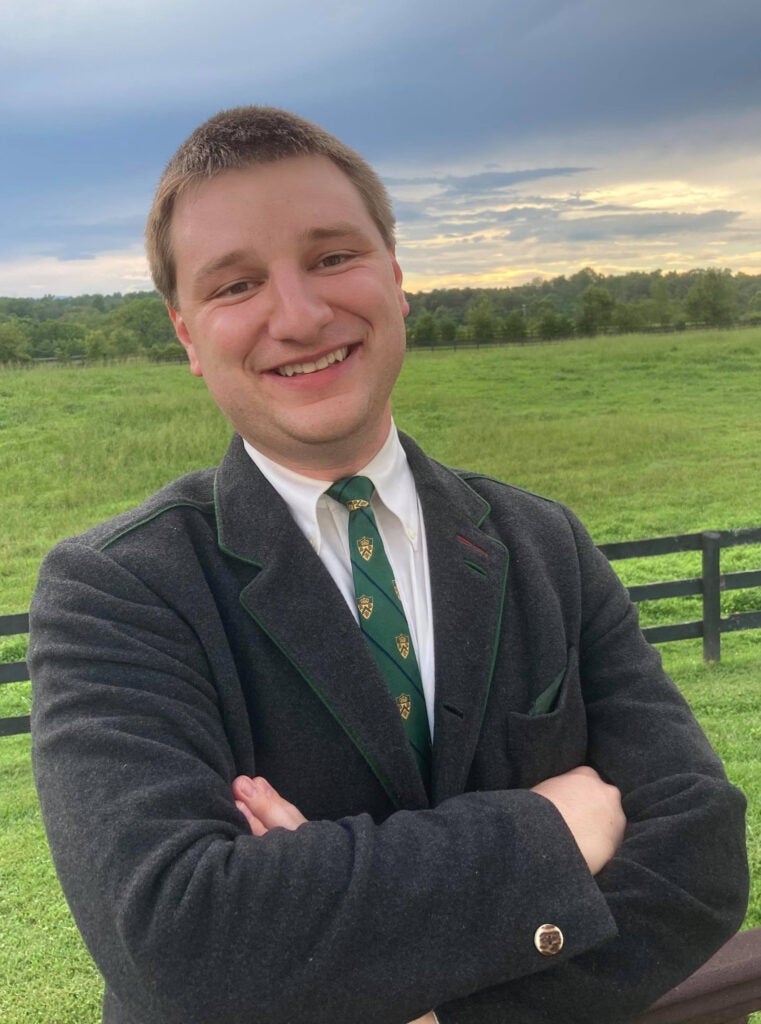
J.B. Potter studied history and German at Hampden-Sydney, a liberal arts college for men. He then served as a Fulbright English Teaching Assistant and worked as a political science translator in Mainz, Germany, where he earned an MA in German through Middlebury College’s C.V. Starr School at Johannes Gutenberg University. After his time abroad, he spent four years teaching German and coaching tennis at inner-city and rural high schools in Virginia.
Through writing and research, J.B. explores the rhetoric of revolutions, the democratization of war, the memorialization of defeat, and the future of transatlantic relations. He is especially interested in how writers, filmmakers, and political leaders shape popular perceptions of the past and provide social commentary on the present by dramatizing historical events and promoting national narratives.
In his spare time, J.B. volunteers as a grant writer for the Inga Foundation , a nonprofit organization that stops slash-and-burn agriculture and ensures food security for subsistence farming communities in the tropics.
Emmanuel Rop, PhD Candidate
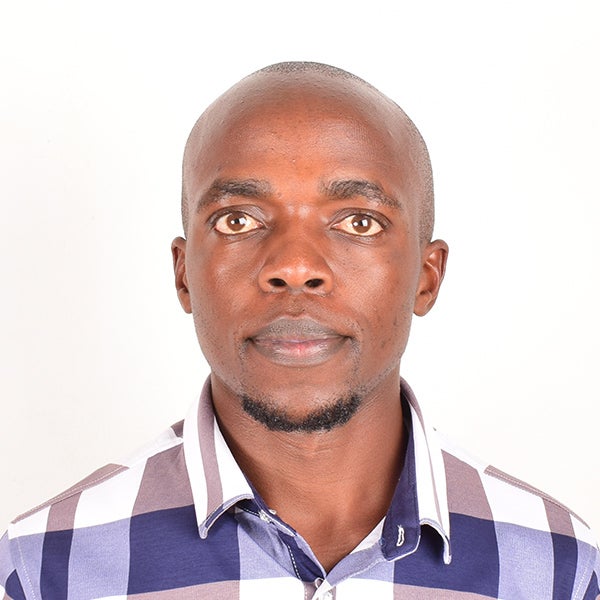
Emmanuel Rop is from Nakuru, Kenya. He earned his B.Ed. (German and Geography) degree from Kenyatta University in 2014 and his M.A. in Intercultural German Studies from the University of Nairobi in 2018. His M.A. thesis was titled “Das Afrikabild in Christof Hamanns Roman Usambara (2007)” and it focused on analyzing the image of Africa as well as the stereotypes associated with the continent in the novel. He has taught German as a foreign language (DaF) at various Kenyan high schools as well as at Moi University where he also taught B.A. German courses.
As a PhD candidate, Emmanuel is interested in researching German places of remembrance “Erinnerungsorte” in Africa, the rediscovery of German colonialism in contemporary German literature, and its discourse in present day Germany and in its former colonies. His CV can be found here.
Kristina Schauhoff, PhD Candidate
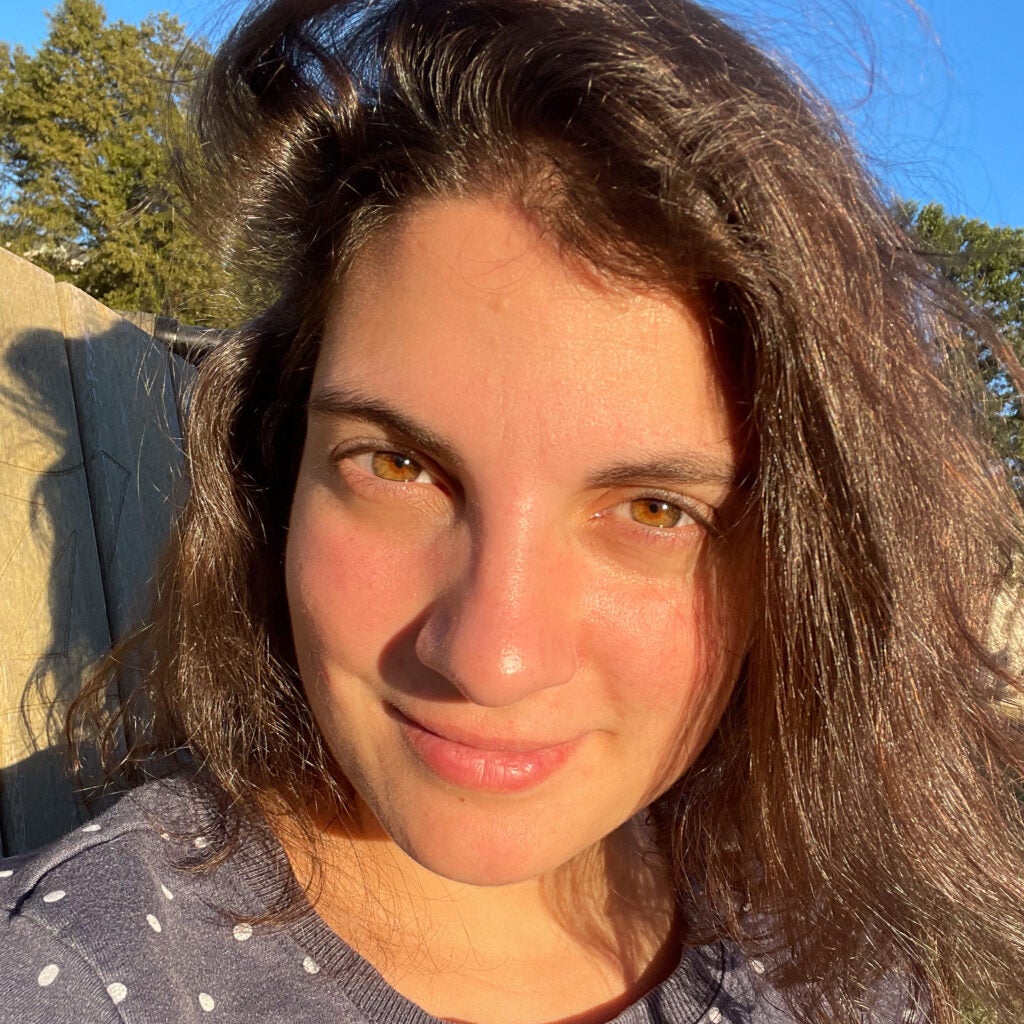
Born and raised in Bonn, Germany, Kristina Schauhoff graduated in 2021 with a Bachelor of Education from the Johannes Gutenberg-University Mainz, Germany, before coming to the University of Alabama as a scholar of the Federation of German-American Clubs (VDAC), where she received her MA in German Literature in May 2023. During her time in Alabama, she primarily focused on the role of humor in literature to critique societal issues, as well as the question of (gender) identity and Heimat specifically in transnational literature. She received the Outstanding Graduate Student of German Award 2022 from the Department of Modern Languages and Cultures at the University of Alabama and served as IT Chair for the 2023 UA Languages Conference.
With her background in teaching, she is especially interested in second language acquisition in connection to phonetics, sociolinguistics, and the use of technology in the FL classroom. Furthermore, her areas of interest also include gender and identity studies, the question of Herkunft and Heimat, cultural studies, humor studies, and the use of time, mainly flashbacks and foreshadowing, in literature.
Sally Simpson, PhD Candidate
Sally Simpson received her Bachelor of Arts in German Studies from Colby College in 2021. After graduating, she lived in Linz, Austria, where she participated in the 2021-2022 Teaching Assistantship Program of the Austrian Federal Ministry of Education, Science and Research (BMBWF), administered by Fulbright Austria (Austrian-American Educational Commission). Her research interests include music, 20th and 21st century women’s writing, and literature, as well as the intersections between them.
Ekaterina Soloveva, PhD Candidate
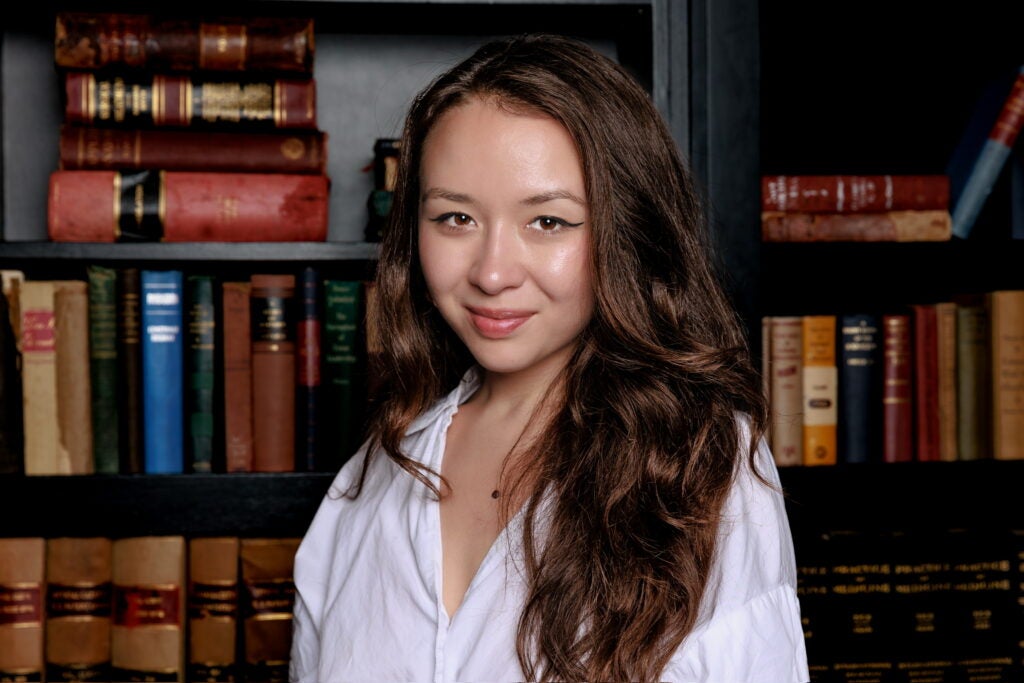
Ekaterina (Katya) Soloveva, a multilingual Ph.D. Candidate at Georgetown University, excels as a translator, researcher, and educator in Washington, DC. Katya was born in Russia, Nizhny Novgorod, in a Russian-Korean family. She received her BA with Honors in Linguistics and Foreign Language Teaching from Lomonosov Moscow State University in 2019. As an undergraduate student she spent some time studying in Germany, Austria, and the USA. While living in Moscow, Ekaterina taught German, Humanities, and English at an international education center and had an internship at the German newspaper in Moscow (Moskauer Deutsche Zeitung). She also worked as an assistant at cultural events organized by the Embassy of Switzerland in Russia. As a student she received the President’s Scholarship for Talented Youth and participated in the Year of Exchange in America for Russians (YEAR) program, organized by American Councils and U.S. Embassy in Moscow. Fluent in English, Russian, and German, Katya worked as a translator for Arte, the German-French TV network.
Currently, Katya’s research centers on post-Soviet migrant identity in Germany on social media. She actively researches social media discourse, utilizing methods like Critical/Positive Discourse Analysis and Systemic Functional Linguistics to investigate the evolving language of the digital era. Alongside her academic pursuits, she teaches German language and Humanities at Georgetown University, passionately amplifying unheard voices through her work and research.
Maria Speggiorin, PhD Candidate
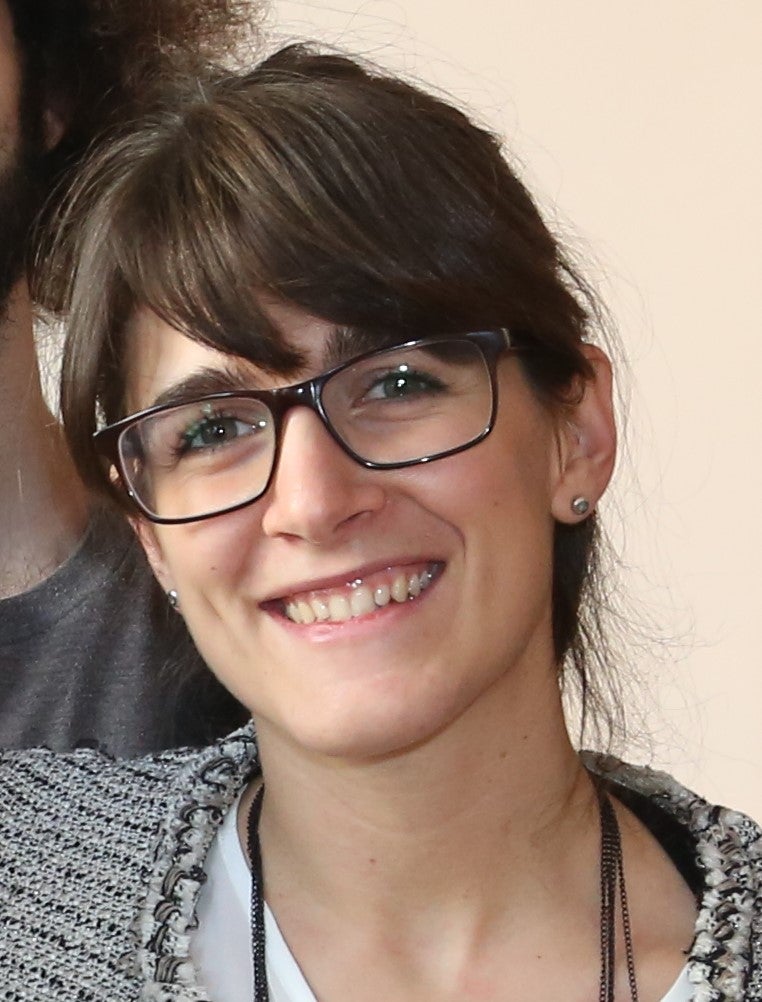
At the end of her BA in Modern Languages and Literature (English and German) at the University of Trento, Maria focused on learner’s autonomy for her final thesis. Maria then further studied in the field of Second Language Acquisition in her Master at the University of Ca’ Foscari in Venice (focus on German) and graduated with a thesis on Experiential Learning and the delivery of Second Language classes through visual art. She then pursued a Master in Germanic Studies at the University of Illinois at Chicago, developing a strong interest in academic research and deciding to further pursue a PhD degree in the Germanic Studies Department at Georgetown with a focus on Second Language Acquisition. During her Master at Ca’ Foscari Maria worked for the Social Cooperative “Adelante” in projects promoting active engagement of pre-teens and teens in their communities, developing a strong will to research learning modalities accessible to a wide variety of learners.
Maria’s research interests include Second Language Acquisition with a focus on Virtual Learning, Virtual Language Exchanges, Task Based Approach and the use of technology fostering effective learners’ autonomy.
Stephanie Strevey, PhD Candidate
Stephanie Strevey graduated with honors from Bryn Mawr College with BAs in English and in German Literature. Her undergraduate thesis, ‘“Dämonendiagnose”: Behinderung, Sexismus und Antisemitismus in der mittelalterlichen Monster-Mythologie Nordeuropas”, which used retroactive diagnosis as an analytical tool through which to re-examine the origins of Dark Age and medieval German monster mythology, received the Hester Ann Corner Prize for Best Thesis in a Foreign Language, and the Berle Memorial Prize in German Literature (2021). As an undergraduate, she worked as a teaching assistant, major representative, and peer tutor for the Bryn Mawr Department of German Studies, and served in her free-time as president of one of the school’s dance teams, and as a team captain for the Fine Arts Program Advanced Hip Hop Ensemble. In high school, she participated in the German-American Partnership Program and other student exchanges with the Friedrich-Ebert-Gymnasium in Harburg, Hamburg. She is also a member of German National Honors Society and a recipient of the American Association of Teachers of German (AATG) Presidential Honor Roll Award.
Beyond folklore/monster narratives and disability studies, Stephanie is deeply interested in the literature of der Romantik (particularly Schwarzliteratur/Nachtliteratur), Medieval Studies, Nordic religions/paganism, Trümmerliteratur & Holocaust Literature, and the history of Germanic Oral Storytelling. She hopes to be able to continue studying these aspects of German culture, history, and media in her graduate work while also pursuing opportunities to engage with new academic concentrations. Her CV is available here.
